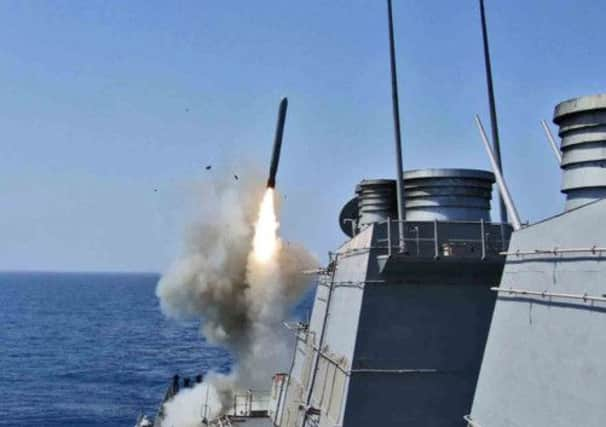Leaders: Syria | Sir David Frost


And, despite the UK government’s defeat last week, might Britain still become involved?
However unlikely that may seem, the developments of the past week advise caution on firm conclusions at this stage. Few a week ago imagined that David Cameron would suffer a humiliating defeat in the Commons on an already modified motion seeking support for any UK involvement in strikes against Syria. And even fewer would have predicted that President Obama, America’s Commander-in-Chief, would choose to wait until he had heard what members of Congress had to say when they reconvene in a week.
Advertisement
Hide AdAdvertisement
Hide AdUp until that presidential briefing, most believed there would be a US air strike within hours. But it is testimony to the potent legacy of the Iraq war that, ten years on, it has profoundly changed the way in which Western powers’ decisions on military engagement are reached. The leaderships of both Britain and America have chosen to seek a wider mandate.
Some will see this as vacillation and cowardice. And they will warn that the consequence of such an abdication of responsibility will weaken the authority both of America and the UK across the Middle East.
Others will see it as a wholly welcome development and a recognition, if belated, of the need for democratic legitimacy in such a major decision as military intervention in a foreign country.
The arguments will rage, and it is unfortunate in both cases that expectations were allowed free rein right up to almost the final minute. But for now, America and Britain have chosen a democratic course – a route conspicuously closed in Syria and other troubled countries in the Middle East.
Even if the US Congress gives the president support for a military strike and deliberations in the UN prove sympathetic to limited action, it is unlikely that Mr Cameron would so quickly go back on his word that he “gets it”. But so volatile is the position in Syria that it is impossible to predict what might now happen.
Should the Assad regime continue with chemical and weapons attacks, or its actions be seen as de-stabilising for the country’s near neighbours, the clamour for intervention to discourage more attacks or to prevent a wider Middle East conflagration could quickly intensify.
The Syrian regime enjoys for now the freedom to strengthen its military deployment and to launch fresh attacks on rebel-held areas. Thus, far from this crisis being defused, it has only moved to a new state of prolonged and heightened uncertainty.
More than 100,000 people have already died and 1.7 million have been made refugees. We have not heard the end of the military intervention option, and certainly not of the Syrian regime’s barbaric treatment of its own people.
Goodbye to first true TV superstar
Advertisement
Hide AdAdvertisement
Hide AdIt IS a measure of veteran broadcaster Sir David Frost’s standing within the media world that news of his death should be accorded precedence on BBC News over latest developments on Syria. But while best remembered as a controversial TV show compere, he made a significant contribution to television in several fields and was a revealing and beguiling interviewer.
His varied career spanned journalism, comedy writing and daytime television presenting. But he will be remembered for two reasons in particular. The first was his role as anchorman in the breakthrough satirical programme That Was The Week That Was in the early 1960s. It attracted millions of Saturday night viewers but enraged older and more traditional people accustomed to a more respectful handling of political figures.
The second was his series of televised encounters with disgraced President Richard Nixon. Here, he overcame the reservations of a sceptical US press corps concerned that he was too much of a glib, light-touch showbiz personality. In a set of revealing encounters broadcast worldwide, Frost was able to extract from Nixon intriguing insights and the nearest to an apology for the actions over the Watergate scandal.
Later innovations included The Frost Programme which ran for a decade. That his broadcasting experience spanned 50 years is powerful testimony to his love of television and his enjoyment of the fame and prestige this conferred. His later political and celebrity interviews paved the way for the rise of the TV interviewer as powerful, combative personalities in their own right. In this he could fairly be said to have struck the first mortal blow against the age of deference.